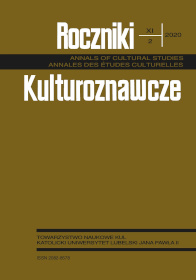Rosenzweig’s Critique of Islam and Its Value Today
Rosenzweig’s Critique of Islam and Its Value Today
Author(s): Zohar MihaelySubject(s): Theology and Religion, Islam studies, History of Islam
Published by: Towarzystwo Naukowe KUL & Katolicki Uniwersytet Lubelski Jana Pawła II
Keywords: Rosenzweig; Islam; criticism; controversial approach; relevance to contemporary discourse
Summary/Abstract: This article focuses on Franz Rosenzweig’s radical provocative views of Islam, which ironically appears in his magnum opus The Star of Redemption (1921), a work considered groundbreaking in its interfaith dialogical approach. The article opens with a short presentation of their main (more popular) point, and the alleged problematic nature of their attitude and style. At this stage I concisely review the evolution of the reference to these views in the scholarship, since the appearance of The Star of Redemption to our day in the late postmodern age. In regard to the relation of the current article to existing literature, it should be noted that it is drawing on insights from a host of different primary and secondary related sources. In addressing the question of the acceptance of Rosenzweig's approach, I refer to opinions of a line of thinkers, which re-appear in the following discussions throughout the article. In particular cases, such as in the concluding section, I mention some more background sources to support my argument. I obviously quote the sources from the Old and New Testaments and the Quran upon which Rosenzeig’s thesis rests. I close the outlining of the article's framework with a formulation of its purpose, namely to gain clarity of Rosenzweig's insights in order to ultimately speculate on its place in contemporary discourse on Islam. Coming across Franz Rosenzweig's, the modern Jewish theologian and philosopher mostly associates with his revolutionary dialogic approach to Christianity, opinions of Islam, one would probably consider him nothing more than another Islamophobe. This may explain the relatively low interest research has for this aspect of his thought, his radical approach considered condescending and his treatment of the subject considered superficial and patronizing. All the more when these insights are found in his The Star of Redemption, considered to be a treatise that opened a new era in the relationship between Judaism and Christianity, setting them as complementary and equal, which no Jewish thinker before him had dared do. The purpose of my paper is to clarify his insights on Islam in The Star, and to explain what can such a view contribute on this topic today, its controversial approach notwithstanding.
Journal: Roczniki Kulturoznawcze
- Issue Year: 11/2020
- Issue No: 2
- Page Range: 5-34
- Page Count: 30
- Language: English

